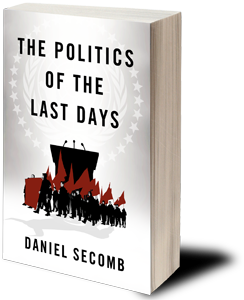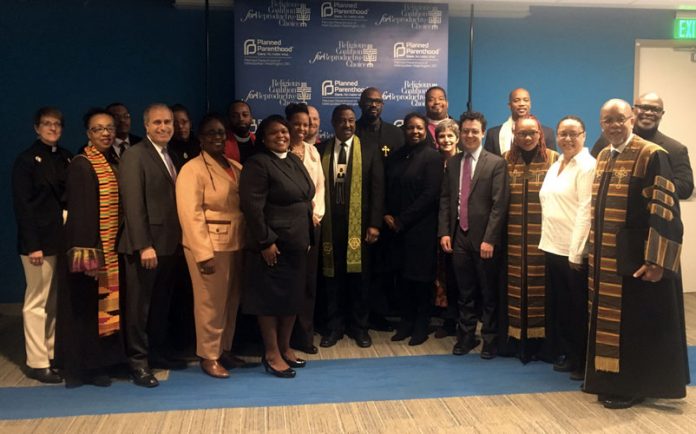As Planned Parenthood fights attacks from Congressional Republicans, more than 20 local faith leaders came together to bless the organization’s newest health clinic in D.C. on Tuesday.
“In almost every message to our staff, I talk about our doing sacred work,” says Dr. Laura Meyers, president and CEO of Planned Parenthood of Metropolitan Washington. “This confirms the sacredness of the work we do.”
The NoMa health facility, which opened in September, rang with the sound of drums as visitors entered, courtesy of all-female percussion troupe Batala Washington. Erin Schmieder, a Batala member, says the group chose to participate in the event organized by the Religious Coalition for Reproductive Choice because “there are a lot of us throughout our lives who have benefited from Planned Parenthood.”
Before the ceremony kicked off, religious leaders gathered upstairs for their own prayer circle, led by Rabbi Michael Namath. The program director of the Religious Action Center of Reform Judaism called upon their obligation to the world to “make it whole and holy.”
Then the formal event began, featuring leaders from different Christian denominations, a rabbi, abortion providers, a Planned Parenthood patient, Hindu priests, an Imam over Skype, visual art, and a liturgical dance.
“I’ve been a Christian longer than I’ve been an abortion provider,” said Willie Parker, who is about as close as the reproductive choice movement gets to a rock star. “Women have been made to think that this [clinic] is some evil place, where God is not,” he continued, pointing out the people “cursing [women] for making sacred decisions. Our answer to the curse is to bless.”
Reverend Doctors Christine and Dennis Wiley of Baptist United Church of Christ organized the event with RCRC and PPMW, and acknowledge that anti-abortion perspectives dominate many religious institutions. “The conservative voices are big,” says Christine. “It drowns out the progressive voices, but it’s not that progressive voices aren’t there.”
Meyers agrees. Anti-choice activists have “tried to separate those of us working on or supporting the right of women to choose a from a sense of deep spirituality,” she says. “So today is a shift in that narrative.”
For many of the speakers at the ceremony, their religious faith was precisely why they stood in solidarity with Planned Parenthood.
Rabbi Namath spoke of the belief in Jewish tradition that making healthful decisions about one’s body is a way to honor God.
“May the ones who bless our ancestors bring healing on all in need,” said Namath in prayer after reciting Hebrew. “God, let your spirit rest upon these caregivers, who serve as instruments of your hands.”
Dr. Serina Floyd, the medical director at Planned Parenthood described how “patients express shame, guilt, or fear about how God will perceive them. Having an abortion does not make you unlovable in God’s eyes,” she said. “Now I can tell patients that this is a blessed space.”
Imam Daayiee Abdullah, America’s first openly gay imam, is normally based in D.C. but joined the ceremony over Skype from Thailand.
Hindu priests Venkatesh Vadhyar and Bragadeesh Balasubramanian of Sri Bhaktha Anjaneya Temple in Frederick chanted a mantra, which Balasubramanian explained “gives a good vibration to the building and anyone who comes in will be healed soon.”
Later, once the ceremony was over and people were cleaning up the chairs, the two remained to flick holy water around the downstairs space because “when we chant mantras, vibrations go through the water,” Balasubramanian says, leaving the negative energy behind.
To cap off the ceremony, people wrote what they needed to get rid of on a stone, which they tossed and replaced with another stone that had a word of blessing—like courage or peace—on it. “Allow yourself to be blessed as you put it under the water and take it with you,” said Christine Wiley, as the group sang “This Little Light of Mine” together.
On their own, though, the stones of peace cannot protect against the legislative onslaught coming for Planned Parenthood and abortion care providers more generally. During a hearing today, attorney general nominee Jeff Sessions declared Roe vs. Wade unconstitutional.
Republicans in Congress have specifically pledged to defund Planned Parenthood.
However, federal funds already can’t be used for abortion care, except in cases of life endangerment, rape, or incest. That means that the defunding effort instead targets Medicare and Medicaid reimbursement for other services that the clinics offer.
In fiscal year 2016, PPMW’s four health centers served a total of 15,007 patients, according to the organization. Spokesperson Mara Braunger notes that, in an average year, they come closer to 20,000 patients annually, but had fewer this year because the new D.C. clinic didn’t open its doors until the fall.
Of the patients, 9,317 came in for female contraceptives, 3,113 for pregnancy tests, 1,081 breast examinations, and 617 for emergency contraception. About one in 10 patients was a man.
And as access to these procedures hangs in the balance, PPMW President Meyers says that
the new facility as a physical reminder of the organization’s values. “Affirmation, love, and care—we designed this space to communicate these values.”
“I remind our staff that this is not the first challenge Planned Parenthood as an organization has faced,” Meyers says. “We are part of something so much larger than ourselves.”
For the Wileys, they say that the election has prompted a new series of talks themed “Walking in the light while living in a world of darkness.” But Christine says that, “particularly as a predominantly African American congregation, African Americans have been used to a sense of adversity and oppression, so this is just another thing. We’ve been in worse places than this.”
Christine notes that the stereotype about black religious communities is that they’re homophobic. (The Wileys were performing union ceremonies years before D.C. law recognized marriage equality.) “There’s a misunderstanding that black clergy are not for this stuff, but most of the people here today are black clergy of different denominations,” she says.
Floyd, PPMW’s medical director, says that since the election, “there has been a change where patients are concerned. I think there is more fear. As a provider, there is also some anxiety about how my ability to provide will be affected.”
She adds that she’s also observed an emboldening of abortion opponents, but “despite whatever fears or anxieties may exist on multiple levels, we do have, on the flip side, an outpouring of support.”
Floyd says she is looking forward to telling patients that “those of faith also support your decisions.”
 Register your interest for Daniel Secomb's new book, "Politics of the Last Days"
Register your interest for Daniel Secomb's new book, "Politics of the Last Days"
Daniel's new book explores the integral and fascinating role that politics will play in the end times.
He demonstrates that political philosophy is actually underpinned by biblcal principles and that by examining the political history of the past can give us a fascinating glimpse into how Biblical end times events will unfold.
Be sure to sign up with your name and email address to be notified of updates and the upcoming release date of the book.



















